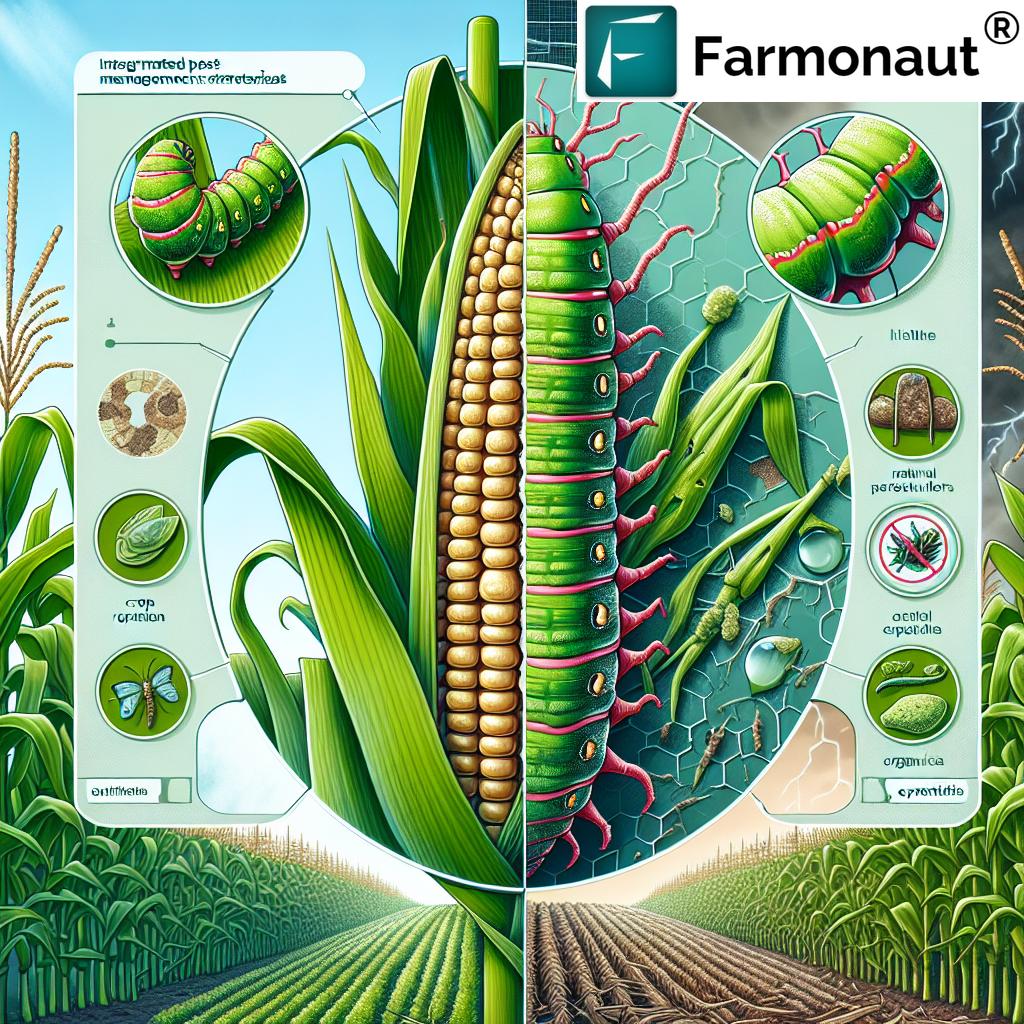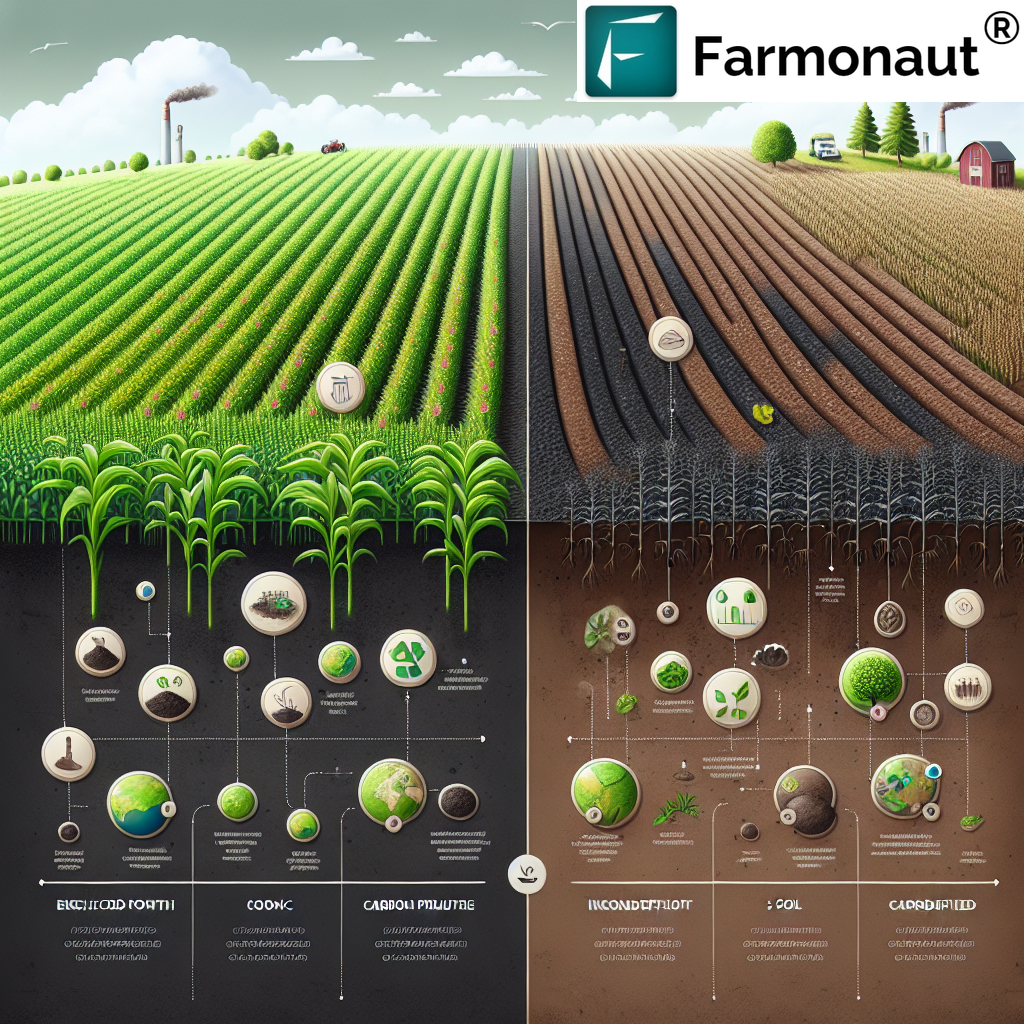Baseline Irrigation Training: Skills for 2025
“95% of global agriculture relies on irrigation; efficient training can save up to 40% water annually.”
Table of Contents
- Introduction: Empowering Sustainable Agriculture in 2025
- Understanding Baseline Irrigation Training
- Key Components of Baseline Irrigation Training
- Importance for Sustainable Agriculture
- Comparison Table: Traditional vs. Baseline Irrigation Training Methods
- Integrating Technology & Digital Tools
- Implementing Baseline Irrigation Training Programs
- Baseline Irrigation Training: The Case for 2025 & Beyond
- Farmonaut: Enabling Modern Irrigation Training & Water Management
- Frequently Asked Questions (FAQ)
- Conclusion: Future-Proofing Agriculture Through Baseline Training
Introduction: Empowering Sustainable Agriculture in 2025
Irrigation remains a cornerstone of modern agriculture, enabling farmers to optimize water use, improve crop yields, and ensure secure food production amid increasingly complex climate patterns. As water scarcity and environmental pressures rise, baseline irrigation training has become essential for agricultural stakeholders seeking to implement efficient, sustainable irrigation practices that align with water conservation goals and embrace evolving technological advancements.
In the context of 2025, where changing rainfall patterns, emerging climate challenges, and soaring food demand define agriculture’s landscape, baseline irrigation training empowers both new and experienced farmers, extension workers, and agricultural professionals with skills to optimize irrigation management for maximum resource efficiency and sustainability.
Understanding Baseline Irrigation Training
Baseline irrigation training refers to a comprehensive set of education activities and capacity-building programs designed to equip farmers, workers, and agricultural professionals with a foundational knowledge and standard skills set in irrigation management and practices. This training establishes a baseline — a minimum proficiency — in modern, data-driven and sustainable irrigation methods.
The Evolution of Irrigation Training: Why the “Baseline” Matters in 2025
Traditionally, irrigation knowledge was passed through generations or learned on the job in local communities. However, as agriculture faces climate change, depleting water resources, unpredictable rainfall, and rapid technology development, a uniform, structured baseline curriculum has become critical. This training ensures core skills, knowledge, and efficiency techniques are accessible to all, regardless of prior experience or geography.
Baseline irrigation training in 2025 goes beyond merely teaching how to turn on a pump or adjust a valve. It integrates aspects such as precision agriculture, analytics, digital tools, and climate-smart approaches into the core curriculum to tackle emerging challenges: severe water scarcity, soil degradation, and the need to balance productivity with environmental stewardship.
Key Components of Baseline Irrigation Training
Let’s break down the core components that shape baseline irrigation training programs in 2025:
-
Water Resource Assessment
- Trainees learn how to assess available water resources – groundwater, surface water, and rainwater harvesting potential.
- Understanding local hydrology enables optimized allocation and prevents over-extraction or mismanagement.
- Tools covered: Water audits, mapping software, field-based resource evaluation.
-
Soil and Crop Water Requirements
- Detailed instruction is provided on:
- Soil types, infiltration rates, and drainage patterns.
- Crop-specific water needs based on growth stages.
- This knowledge allows farmers to avoid both under-irrigation (risking yield losses) and over-irrigation (leading to nutrient leaching and soil harm).
- Detailed instruction is provided on:
-
Irrigation Methods and Technologies
- The training introduces various modern irrigation systems: drip, sprinkler, and furrow.
- Emphasis is placed on selecting methods suited to farm size, crop varieties, and local water availability.
- Guidance on efficiency upgrades for existing systems: replacing leaky pipes, optimizing pressure, retrofitting with sensors.
-
Irrigation Scheduling
- Trainees gain skills in using tools like tensiometers, soil moisture sensors, and weather forecasts.
- Instruction in determining the right timing and quantity of water application to maximize efficiency and minimize waste.
-
Water Conservation Techniques
- Techniques highlighted: Mulching, deficit irrigation (applying less than full crop water needs), and reuse of treated wastewater.
- Practice in maintaining optimal soil moisture and reducing demand for freshwater inputs.
-
System Maintenance and Troubleshooting
- Routine maintenance: checking filters, nozzles, pump operation, and detecting leaks early.
- Immediate action protocols to prevent extensive damage and ensure ongoing system efficiency.
-
Data and Technology Integration
- Emphasis on using digital tools and analytics (mobile apps, satellite data, remote sensors).
- Trainees learn to interpret real-time data for smarter scheduling and faster response to weather changes or system faults.
The Importance of Baseline Irrigation Training for Sustainable Agriculture
Water is the lifeblood of productive agriculture. Yet, inefficient irrigation methods remain the single largest source of water wastage in global food production. In many regions, traditional irrigation practices result in less than 40% water use efficiency, contributing to soil salinization, declining yields, and environmental degradation.
Baseline irrigation training enables a seismic shift towards sustainable practices by:
- Empowering farmers with foundational skills to align irrigation use with actual crop and soil requirements.
- Reducing energy consumption (by preventing unnecessary pumping and system overuse).
- Improving overall water management efficiency and minimizing nutrient run-off for better environmental outcomes.
- Strengthening resilience to drought and climate volatility through adaptive irrigation scheduling and technology integration.
- Boosting yields and securing food production even amid unpredictable rainfall patterns.
The universal adoption of baseline irrigation training is a direct lever for conservation goals, climate adaptation, and agricultural profitability
“By 2025, modern irrigation methods could boost crop yields by 20% even under climate stress.”
Comparison Table: Traditional vs. Baseline Irrigation Training Methods
| Key Training Aspect | Traditional Irrigation Methods (Estimated Data) |
Baseline Irrigation Methods (Estimated Data) |
Sustainability Impact |
|---|---|---|---|
| Water Use Efficiency | ~40% efficient | ~75% efficient | Major reduction in water wastage and enhanced conservation |
| Crop Yield Improvement | Up to 10% gain | Up to 25% gain | Increased productivity, less risk during water stress |
| Technology Integration | Manual/Visual methods | Sensor-based, satellite-driven, app-guided | Real-time decisions, climate-smart actions, data analytics |
| Labor Requirements | High, time-consuming | Moderate, task-optimized | Frees time for sustainable practices/income generation |
| Climate Resilience | Limited (reactive) | High (proactive & adaptive) | Enables rapid responses to unpredictable weather patterns |
| Environmental Impact | High: risk of run-off, salinity, over-use | Low: conservation, resource balance | Protects soil health, local water tables, and ecosystems |
Integrating Technology & Digital Tools into Baseline Irrigation Training
2025 marks an inflection point where irrigation and technology are inseparable. Baseline irrigation training now includes both digital and hands-on skillsets, ensuring trainees can manage modern irrigation systems effectively:
- Mobile apps for irrigation scheduling, visualization of weather forecasts, and tracking soil moisture.
- IoT sensors for real-time monitoring of soil moisture, ambient weather, and irrigation flow – drastically increasing efficiency and allowing precision management.
- Satellite-based data (e.g., NDVI and NDWI indices) for field-wide water stress analysis, crop monitoring, and early warning alerts.
- Decision-support tools powered by AI and machine learning analytics to empower well-informed interventions.
The integration of technology not only improves resource allocation but also enables sustainable practices on both individual farms and across large agricultural landscapes.
Are you a developer or looking to integrate satellite-driven irrigation insights?
Explore our robust Farmonaut API for real-time agricultural, weather, and water management data, or go deeper with our API developer docs.
Digital Tools for Your Farm & Training Journey
-
Comprehensive Farm Management:
For training programs, scaling up farm mapping, and precision resource allocation, see our Large Scale Farm Management solution for digital monitoring. -
Carbon Footprinting and Environment:
Stay sustainable—track your carbon impact, optimize water, fertilizer, and irrigation practices with Farmonaut’s Carbon Footprinting for agriculture. -
Product Traceability:
For food security and supply chain sustainability, our Product Traceability tools use blockchain and satellite monitoring for environmental and market trust. -
Crop Loans & Insurance Verification:
Need reliable field verification for irrigation investments or climate finances? Farmonaut’s Crop Loan & Insurance services use satellite data for fast, fraud-proof reporting.
Implementing Baseline Irrigation Training Programs
Bringing baseline irrigation training to life requires robust and accessible programs. In 2025, successful rollout focuses on inclusivity, local adaptation, and ongoing support for both smallholders and large commercial farmers:
Core Principles for Effective Training Implementation
- Local Relevance: Tailor content, language, and examples to suit local crops, soil types, and hydrological challenges.
- Hands-on, Demonstration-based Learning: Combine classroom-style sessions, field demonstrations, and digital tutorials.
- Digital Accessibility: Integrate web platforms and mobile apps for continued learning, troubleshooting, and data sharing.
- Extension Support: Equip trainers and agricultural extension workers with standardized, modular training resources.
- Feedback & Adaptation: Encourage ongoing feedback loops to iterate and improve training methods.
To maximize engagement:
- Use audio-visual aids, translated manuals, and SMS reminders.
- Leverage digital platforms for weather alerts, irrigation guidance, and rapid communication between trainers and farmers.
- Promote community-based field schools, peer mentoring, and local champion farmers as role models.
Supporting Mobile and Web-First Learning
For both instructors and farmers, seamless mobile and web-app access empowers self-paced, ongoing improvement. You can easily integrate the latest training modules and monitoring insights into daily workflows by accessing:
With online learning and remote monitoring, irrigation training in 2025 becomes accessible anywhere – even in the most remote locations.
Baseline Irrigation Training: The Case for 2025 & Beyond
The climate of 2025 is defined by change—drought risk, unpredictable rainfall, emerging environmental pressures, and a persistent need for food security. Here’s why baseline irrigation training is a critical tool for the future:
- Water Scarcity: With global resources stretched, every drop counts. Training that ensures high efficiency reduces demand and secures supply for all users.
- Yield Reliability: Efficient irrigation management minimizes the risk of yield loss during heatwaves or unpredictable rainy seasons.
- Environmental Protection: Preventing over-irrigation avoids soil salinity, leaching of inputs, and local water table depletion.
- Climate Resilience: Climate-smart approaches mean farmers can adapt to rapid changes, protect their livelihoods, and steward the land for the next generation.
- Data-Driven Decision-Making: In the era of digital agriculture, the ability to interpret field and weather data is a key skill—equipping trainees with this edge is central to all baseline programs.
Integration of AI, blockchain, and remote sensing into agricultural practices is no longer futuristic—these are requirements for any successful farm enterprise or extension worker seeking to make a difference in 2025 and beyond.
Farmonaut: Enabling Modern Irrigation Training & Water Management
At Farmonaut, we are driven by a mission to democratize access to satellite technology, AI insights, and blockchain tools for agriculture and resource management. Our platform empowers thousands of users—from individual farmers to government agencies—with the ability to monitor crop health, assess field-level water stress, schedule precise irrigation, and track environmental impacts.
How do Farmonaut technologies align with baseline training?
-
Satellite-Based Monitoring:
Monitor crop vigor, soil moisture, and field variability with up-to-date satellite imagery—enabling smarter irrigation and resource decisions. -
JEEVN AI Advisory:
Access real-time weather forecasts, actionable crop advisories, and tailored recommendations to improve irrigation scheduling and climate adaptation. -
Blockchain Traceability:
Ensure product and land resource traceability to build market trust, comply with sustainability goals, and streamline process verification. -
Fleet and Resource Management:
Use our tools for efficient irrigation infrastructure logistics, fuel savings, and optimized deployment across large farming operations.
Learn more about Farmonaut’s Fleet Management solutions. -
Environmental Impact Tracking:
Instantly quantify the environmental effects of irrigation and farm practices and access insights for improvement.
Our platform is available as a subscription—see pricing details and get started below:
Frequently Asked Questions (FAQ) on Baseline Irrigation Training
1. What is baseline irrigation training?
Baseline irrigation training refers to standardized education programs designed to equip farmers and agricultural professionals with the fundamental skills needed to implement modern, efficient, and sustainable irrigation practices. It includes water resource assessment, scheduling, technology use, maintenance, and the latest conservation methods.
2. Why is it essential in 2025?
As climate patterns grow more erratic and water scarcity threatens food production, proficiency in efficient irrigation is critical for agricultural resilience, yield security, and environmental stewardship.
3. How does baseline irrigation training differ from traditional methods?
Unlike traditional, experience-based learning, baseline training is structured, data-driven, and integrates digital tools (e.g., sensors, satellite data, mobile apps). This ensures greater water use efficiency, yield improvement, and climate resilience.
4. What new technologies are involved?
Key technologies include IoT soil moisture sensors, weather forecasting apps, satellite-based crop monitoring, AI-powered scheduling tools, and blockchain for traceability and compliance.
5. Can smallholder farmers benefit from this training?
Absolutely. Modern training materials are designed for all literacy levels and scalable to small farms, using accessible technology—often available via mobile phones or local extension services.
6. Where can I access digital irrigation management tools?
You can access Farmonaut’s web and mobile-based platform here, as well as via iOS and Android apps for real-time insights and resource management.
7. Is baseline irrigation training relevant for large commercial farms?
Yes, especially due to the significant resource savings in water, energy, and improved compliance with environmental standards. Digital and satellite-driven tools are vital for managing large-scale operations efficiently.
Conclusion: Future-Proofing Agriculture Through Baseline Irrigation Training
Baseline irrigation training stands as a powerful empowering tool for sustainable agriculture in 2025 and beyond. By building a robust standard of skills, knowledge, and technological integration, it enables farmers and agricultural workers across the world to:
- Optimize water use and reduce operational costs
- Improve yields and resilience to climate shocks
- Minimize environmental impact and conserve soil health
- Secure food production amid changing climate patterns
- Align with food security and conservation goals at local, regional, and global levels
- Leverage real-time data, AI, and blockchain traceability for environmental compliance and market trust
As water resources become more constrained and demand for resilient agricultural systems grows, embedding baseline irrigation training in all agricultural extension and professional development programs is not just beneficial—it’s indispensable.
Start your journey toward data-driven, water-efficient farming today.
Download the Farmonaut app for Android

or iOS

Or access Farmonaut’s web app

to put modern irrigation management solutions in your hands—every season, every climate, every field.











